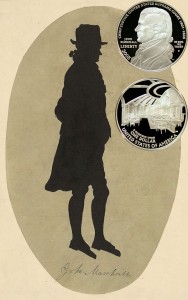Today, the Chief Justice John Marshall Commemorative Silver Dollar Coin remembers the contributions of the revered statesman on the 214th anniversary of his swearing in ceremony.
In the 19th century book, Historic Americans, Elbridge Streeter Brooks wrote about the chief justice and provided an anecdote from his latter years:
For thirty-five years John Marshall remained at the head of the Supreme Court as chief-justice of the United States. Impartial, judicial, courageous, clear, discriminating, just, and wise, possessing alike what are called the judicial instinct and the constructive faculty, he taught, by his opinions and his decisions, the supreme power of the nation and the supreme position of the Constitution of the United States as the written law of the land.
He did this so well, so forcibly, and so decisively that he established, as much as any other American statesman, the value of the Constitution as a permanent authority, and the position of the nation as the head and controller of the affairs of the Republic.
Through all the changes of parties and presidents he remained the head of the greatest legal body on earth, in a position which he appreciated so highly that he declared he preferred to be chief- justice to being president.
And yet, notwithstanding the dignity of his position and the greatness of the responsibilities it entailed, he remained throughout his long and priceless service the same simple, sweet-tempered, helpful, earnest character that he was when, amid the snow-covered huts of Valley Forge, he kept up the spirits and lightened the depression of his comrades.
For more than forty years he was a member of the Richmond Quoit Club, and he was as keen and deft a hand at that athletic sport as when, years and years before, he had challenged his companions to a game on the parade ground where Taliafero’s “shirt men” gathered for their muster.
In all things which he believed, his convictions were deep and his loyalty to them lasting.
One evening, in a tavern in the town of Winchester, in Northern Virginia, a group of three or four young lawyers were discussing, first, eloquence, and then religion.
As they talked, a gig drove up to the tavern and a tall, bright-eyed, venerable man came into the room. He wore his hair in a queue, and was plainly dressed, so plainly, in fact, that the young debaters took him for some travelling farmer, and simply nodding their “How d’ye do?” went on with their discussion.
All the evening the talk continued, each one airing his opinions and advancing his arguments until it seemed as if the advocates of Christianity were getting the worst of the discussion, while near at hand, a silent, modest-appearing listener, the old man still sat, as if deriving alike benefit and information from the words of the heated young disputants.
Suddenly one of the young fellows who had taken the stand against Christianity, as if to see how convincing his arguments had been to an outsider, turned to the old man and asked brusquely and just a bit patronizingly, “Well, old gentleman, what do you think about these things?”
A more surprised group of over-confident young men would have been hard to find when the “old granger,” as the boys of to-day might have called the unassuming traveler of the rickety gig, replied directly to the carelessly put question of the young debater; for he entered at once upon a defense of Christianity so clear, so forcible, so simple and energetic, and yet, withal, so direct and convincing, that doubt was conquered and even unbelief was checked.
The young men sat intent and silent, with no arguments to advance in rebuttal and with only delight and admiration for the speaker’s words.
Still they sat silent as the stranger rose and bade them a cheery good-night. Then curiosity got the better of appreciation, and they fell to wondering who the “old gentleman” was.
“Must be a parson,” one of them remarked.
“Sure,” assented another. “He talked just like a preacher. I wonder where he ‘s from ?”
Just then the landlord came back from lighting his guest to bed.
“Who was the old party? Where does he come from? Where does he preach?” were the questions that greeted him from all parts of the room.
“Preach? What are you talking about, boys? He’s no preacher,” said the landlord, with the superiority of knowledge. “Didn’t you know who it was? That was Judge Marshall, from down in Fauquier county.”
The young fellows looked at each other in dismay.
“Judge Marshall ? ” they said. ” Not —”
“Yes, but it was, though,” replied the landlord, answering their unspoken and hesitating inquiry. “That ‘s Judge John Marshall, chief-justice of the United States. Reckon the old gentleman knows more than you thought he did, eh? Oh, yes, I knew him all the time.”
But while the landlord laughed aloud at their discomfort more than one of these young men recalled the earnest, convincing and inspiring words of the speaker, and never forgot the faith or the fervor of Chief-Justice Marshall.
So with blended humor, pathos, and dignity, with love of sport and strength of belief, with simple tastes and homely manners, but with the courage of his convictions, a strong mind, a masterly grasp, and an intelligence and breadth that lifted him above his fellow-workers, the life of John Marshall, the great chief-justice, kept the tenor of its way unto the end.
=====
The Chief Justice John Marshall Commemorative Silver Dollar Coin shows against a full-length silhouette portrait of the legislator and jurist, circa 1782.
